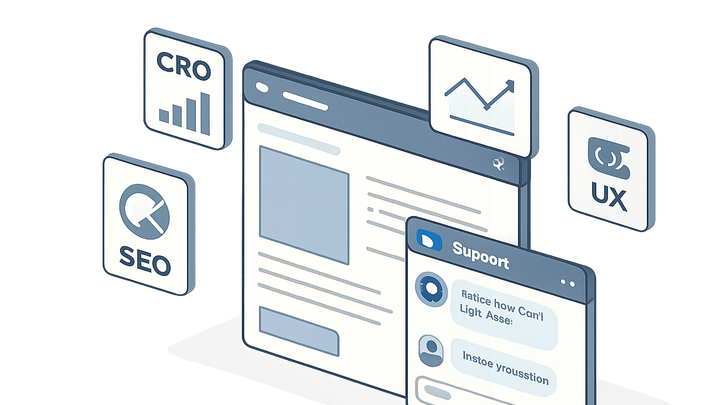Published on 2025-06-29T21:09:49Z
What is Live Chat? Examples for Live Chat in CRO, UX, and SEO
Live Chat refers to a website feature that enables real-time text-based conversations between visitors
and support agents or chatbots. It plays a crucial role in conversion rate optimization
(CRO), user experience (UX), and even SEO by engaging users,
addressing inquiries instantly, and guiding them through the buyer’s journey. With Live Chat, businesses
can reduce friction, answer questions, and personalize interactions on the spot. Modern solutions like
Prevue.me offer in-depth critiques of Live Chat implementations, analyzing placement, trigger
behavior, messaging, and accessibility compliance. By evaluating chat performance and making data-driven
adjustments, companies can maximize lead generation, improve engagement metrics, and ensure accessible
experiences for all users.
Live chat
Live Chat is a real-time messaging tool on websites that boosts conversion rates, enhances UX, and drives lead generation.
Why Live Chat Matters for CRO and UX
Live Chat allows websites to engage visitors instantly, answer questions, and guide users through conversion paths. By addressing concerns in real time, it reduces friction, builds trust, and ultimately improves conversion rates and user satisfaction.
-
Real-time engagement
Respond to visitor queries the moment they arise, preventing drop-offs and keeping users on the path to conversion.
- Response time:
Aim for under 30 seconds to maintain visitor attention and convey responsiveness.
- Availability:
Set clear operating hours or use chatbots off-hours to manage expectations.
- Response time:
-
Personalized support
Tailor conversations based on user behavior, location, or referral source to increase relevance.
- Behavioral triggers:
Use page visit patterns or time on page to trigger personalized chat invites.
- User data integration:
Integrate with CRM to pull user info and deliver context-aware assistance.
- Behavioral triggers:
-
Reducing bounce rates
Proactively engaging visitors can address doubts and encourage deeper exploration of your site.
- Proactive chat invitations:
Trigger chats after specific time thresholds or interactions to recapture attention.
- Targeted messaging:
Craft messages relevant to the visitor’s entry point or interests.
- Proactive chat invitations:
Implementing Effective Live Chat on Your Website
Successful live chat setups require careful selection of tools, strategic placement, and thoughtful configuration to align with user needs and business goals.
-
Choosing the right chat widget
Select a solution that integrates seamlessly with your tech stack and offers customization.
- Customization options:
Look for themes and branding settings to match your website’s design.
- Integration capabilities:
Ensure compatibility with CRM, email marketing, and analytics platforms.
- Customization options:
-
Defining chat triggers and entry points
Determine when and where chat invitations appear to maximize engagement without being intrusive.
- Exit-intent popups:
Trigger chat invites when users move to close the tab to reduce abandonment.
- Scroll-based triggers:
Engage users who reach specific sections or have scrolled past key content.
- Exit-intent popups:
-
Crafting chatbot vs. human chat balance
Decide which interactions to automate and when to route to a live agent for best user experience.
- Automated faqs:
Use chatbots to handle repetitive queries instantly and free up human agents.
- Live agent escalation:
Provide clear options to transfer to a human agent when conversations become complex.
- Automated faqs:
Measuring and Optimizing Live Chat Performance
Continuous measurement is key to refining your live chat strategy; track metrics, run tests, and iterate to improve outcomes.
-
Key metrics to track
Monitor metrics like response time, chat duration, conversion rate, and customer satisfaction scores to gauge effectiveness.
- Chat-to-conversion rate:
Percentage of chats that result in a desired action like form submission or purchase.
- Average response time:
Time taken for initial reply; shorter times generally boost satisfaction.
- Chat-to-conversion rate:
-
A/b testing chat experiences
Experiment with different scripts, triggers, and UI designs to identify top-performing variations.
- Script testing:
Compare different greeting messages or offers to see which drives more engagement.
- Trigger timing:
Test immediate vs. delayed triggers to determine optimal engagement moments.
- Script testing:
-
Integrating with analytics tools
Feed chat data into analytics platforms to understand user behavior holistically and correlate chat interactions with SEO and CRO metrics.
- Google analytics:
Set up events for chat opens, messages sent, and conversions to track in GA dashboards.
- Crm sync:
Automatically log chat transcripts and lead info in your CRM for follow-up and attribution.
- Google analytics:
Example: Prevue.me Live Chat Critique
prevue.me provides actionable critiques for live chat implementations, focusing on CRO, UX, SEO, and accessibility improvements.
-
Actionable cro recommendations
prevue.me identifies chat placement, trigger timing, and messaging tweaks to boost lead capture and conversion rates.
- Optimized trigger settings:
Recommends adjusting triggers based on visitor behavior for higher engagement.
- Call-to-action refinement:
Suggests stronger CTAs in chat greetings tailored to user intentions.
- Optimized trigger settings:
-
Ux and accessibility insights
The platform examines chat widget design for color contrast, keyboard navigation, and screen reader compatibility.
- Contrast and readability:
Ensures chat text meets WCAG contrast ratios for visibility.
- Keyboard navigation:
Checks tab order and focus management for seamless navigation.
- Contrast and readability:
-
Leveraging data for lead generation
prevue.me analyzes chat transcripts to uncover common objections and refine lead-gen strategies.
- Keyword extraction:
Extracts frequently mentioned concerns to inform content and offer creation.
- Follow-up automation:
Recommends automated email sequences triggered by chat interactions.
- Keyword extraction:
